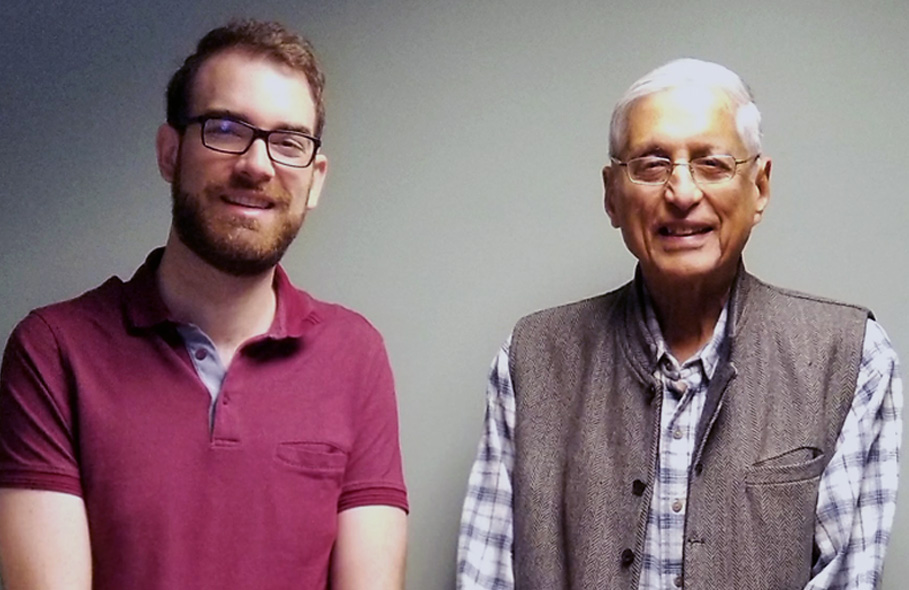Learning “How to Get On” in a Diverse World
by Tom Hanlon / Mar 30, 2019

What role does education play in helping people from diverse backgrounds get along? That is the focus of Thaddeus Herman’s PhD research—and that research has been enriched by his experience with University of Illinois Professor Rajmohan Gandhi.
Thaddeus Herman’s PhD research, in global studies in education, is focused in Lucknow, a multicultural city in North India that lies approximately 530 kilometers southeast of New Delhi, where Rajmohan Gandhi grew up.
But for the moment, both men are on the University of Illinois at Urbana-Champaign campus, within walking distance of each other. Which is fortuitous for Herman, because his research is deeply tied to Mahatma Gandhi’s principles of unity within diversity—and Rajmohan Gandhi, the grandson of Mahatma Gandhi, is the world’s foremost authority on Gandhi’s life and views of unity among diverse people. Rajmohan Gandhi has published multiple biographies of his grandfather and is renowned as a historian, researcher, and author.
It was Herman’s PhD advisor, Linda Herrera, a professor in the Education Policy, Organization and Leadership (EPOL) department at the University of Illinois’ College of Education, who suggested in the spring of 2018 that Herman meet with Gandhi, a fellow EPOL professor.
A Symbiotic Relationship
Herman and Gandhi quickly formed a symbiotic relationship.
“He set me in a good direction with my research,” Herman says. “I was struggling with how to tie it all together. Paraphrasing, Professor Gandhi said ‘It seems to me the overarching need of the world today is we have to learn how to get on with one another. Maybe you can learn something about that.’ It was both simple and profound, and it was the framing I needed.”
Herman’s work in Lucknow is centered in City Montessori School, whose 20 campuses exceed 50,000 in enrollment, and which in 2011 was listed in the Guinness Book of World Records as the largest school in the world.
“City Montessori claims two different sources of inspiration for its curriculum, and one is Mahatma Gandhi,” Herman says. Indeed, the school was founded in 1959 by the husband-and-wife team of Jagdish Gandhi and Bharti Gandhi. Jagdish changed his last name at age 11 from “Agrawal” to “Gandhi” when he learned of Gandhi’s assassination.
“They wanted to take Gandhi’s teachings about oneness and try to put them into a school form and see what that would look like,” Herman explains. “Later, they became familiar with Baha’i educational philosophy. My research is looking at these two educational philosophies and how they are practically applied in schools.”
Gandhi’s Online Course
For his part, Herman is acting as Gandhi’s teaching assistant for an eight-week online graduate course called “Learning from Gandhi.” The course explores Gandhi’s views and philosophy on life and education.
“Professor Gandhi has a spirited approach in terms of framing how to think about Gandhi in the modern age,” Herman says. “While Gandhi’s move for independence and all he wrote and taught about was in the period and context of achieving independence from the British, there are principles that Gandhi applied back then that can be applied in today’s world.”
Herman’s primary role has been to develop the course technology-wise. “My main responsibility is making sure he can deliver the course in the way he’s envisioned it in his head,” he says. He notes that while this is Gandhi’s first-ever online course, the professor has learned swiftly about this mode of delivery.
“He said it’s never too late to learn something new,” Herman says. “He’s embraced the online mode of delivery very enthusiastically, and he’s aware that the College of Education has great expertise in online education. So he’s thrown himself in there with gusto.”
Herman also created one of the main assignments for the course, a Google map tour that takes students to various locations connected with Gandhi. “You can see the streets where Gandhi walked, the streets he lived on. We’re having students choose a specific period of time or geographic location associated with Gandhi’s life and having them make a map tour,” Herman says. “The students seem excited about that.”
Learning "How to Get On"
Through his research, Herman hopes to discover how to take the ideas of oneness and unity of mankind and see how they can impact education. “I want to see how those high-minded philosophical ideas get translated into a curriculum or maybe into a hidden curriculum, how they influence the day-to-day operation of a school,” he says. (A “hidden curriculum” involves things that children learn in school that aren’t consciously a part of what the curriculum is trying to teach.) “To put it in Gandhi’s terms, ‘How to get on,’ how to teach that, how to practically apply that in a school setting. That’s what I’m investigating.”
Herman hopes to be in the field within the year to continue his research in Lucknow. In the meantime, though, he continues to help Rajmohan Gandhi deliver the online course on Mahatma Gandhi, and he continues to appreciate his experience with Gandhi.
“He is a very kind man,” Herman says. “He carries himself with a spirit of humility that you would expect from someone who was trained to walk in the footsteps of Mahatma Gandhi. He has a very approachable spirit.
“He is also very passionate about this idea of unity and diversity and how diverse groups can get along. That’s a high priority for him, and that’s exciting for me because it’s important for us to learn about the human species, how we can foster unity among people from diverse backgrounds.”